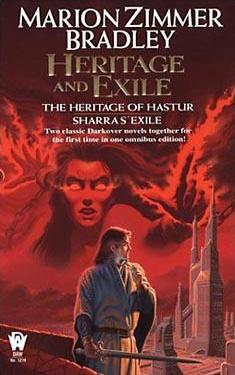Marion
Zimmer Bradley
Completed 1/18/2020,
Reviewed 1/18/2020
3 stars
This is my
first MZB novel, and I was reassured by a lot of the reviews I read that although
this is book nine in the Darkover series, this was the one to start with. It did stand on its own, with a fairly self-contained
story, and characters introduced as if it were a stand-alone novel. The world building is also quite exceptional
and the plot complex and interesting. Yet
I didn’t feel that the sum of its parts added up to a satisfying whole. I chose this book because it is considered important
in LGBTQ speculative fiction history in its portrayal of a gay main character
in mainstream speculative literature. (I
use “speculative” here because it’s something of a cross between science
fiction and fantasy). The book is good,
but not as great as I was expecting, or hoping, it would be.
The story is
about two young men on the planet Darkover who are frustrated with the
traditional ways of their society. Regis
Hastur is the heir to the Hastur domain, the strongest domain of the seven
domains on the planet. He doesn’t want
to be. He wants to travel the stars and
see the Terran galactic empire. Besides,
he doesn’t seem to have the gift of psychic powers, known as laran, which is
practically a necessity for a ruler. His
grandfather, the regent, says he will allow him to go if Regis spends three
years in cadet training. Regis agrees. The
other young man, Lewis Alton is heir to the Alton domain, Regis’ childhood
friend, and an officer in the cadets.
The book tells of their time in the cadets, and then segues into a tale
of the matrix of Sharra, a potentially evil power that a renegade domain wants
to wield to overthrow the Terran presence and the Darkover power structure. Lew is initially seduced by a veil of
goodwill by the domain, but he and Regis eventually must find a way to stop this
power.
Regis is a
fiery character, full of unrealized privilege.
Going into the cadets knocks down his ego and helps to round him
out. There he meets and is befriended by
Danilo, a young man from a poor family who has a history of the men being
right-hand men to the Hastur heirs. It
is with Danilo that Regis’ homosexuality is brought to the surface. We also find that Regis’ closetedness is what’s
holding back his laran powers. However,
Regis is afraid of professing his love because Danilo is being sexually and
psychically harassed by a commanding officer and also because Danilo comes from
a conservative religious tradition. This
causes a lot of conflict for Regis. It
makes him a very well fleshed-out character.
Lewis is
also a strong character, fighting with his own coming of age. His father tries to prepare him to take over
the domain, initially by matchmaking, and eventually by sending him as emissary
to the renegade domain. There, Lewis falls
in love with their ruler’s daughter. But
their love is taboo as she is made a Keeper, that is the central figure of the
circle that controls the power of a matrix, which demands being chaste. Again, we have unrequited love, but in a
different context.
If all this
sounds confusing, it kind of is. The
book is very complex, but highly readable.
Everything from the traditions to the matrix is explained in great
detail. I didn’t feel that I had needed
to read any of the previous books to understand it. My main problem with the book was that in the
end, I wasn’t satisfied with it. The
characters were well-drawn, the world-building was tremendous, and the plot
well thought out. But by the end, I was
exhausted from it. I think MZB packed
too much into it. At only 350 pages, the
book felt a lot longer. Towards the end,
I just wanted it to end. I was becoming
bored with it, tired of waiting for Regis to come out to Danilo and tired of
Lewis being trying to subvert the renegade domain’s use of the matrix of
Sharra. That’s why I felt the whole didn’t
match the sum of its parts. The tension
just didn’t hold my interest.
I give the
book three stars of out five. I felt it
was a good book but would have been better if it could have held my attention better
in the last quarter.

No comments:
Post a Comment